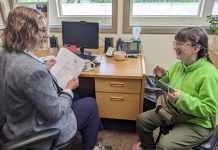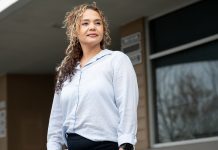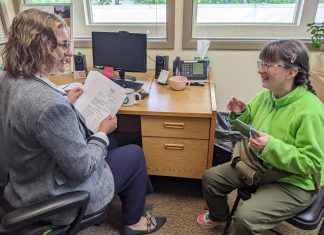Debra Conlan, RN has worked as an obstetrics and gynecology (OBGYN) nurse for about 30 years, and has specialized in lactation support since she became certified in the late 90s. Upon moving to Bellingham she realized that there was a need for an outpatient lactation program in our area. She worked with PeaceHealth to develop such a program five years ago.

In addition to the many breastfeeding classes and support groups offered by PeaceHealth, outpatient lactation consultants are available to any new mother in need in Whatcom County at PeaceHealth’s Obstetrics and Gynecology Clinic.
“Initially we see patients for education around breastfeeding,” shared Conlan. “Mostly these are new moms who have never had a baby before who need help with the dexterity of holding the baby and learning about the benefits of breastfeeding.”
Women who need help from a lactation consultant usually have their first appointment three to five days after they’ve had their baby. They can continue to see them for support throughout the baby’s first year. The program was a bit slow to start, but now they see 20 to 30 women for one-on-one visits every week depending on the local birth rate. It’s a big hit with patients and doctors alike.
“Pediatricians and family doctors love that we’re here,” shared Conlan. “We get a lot of referrals from the community and from PeaceHealth.”
These consultations help new mothers learn how to breastfeed, how to tell if their baby is getting enough to eat, what a day might look like as far as feedings go, and what to do if things don’t go as expected. Consultations can also be helpful to women who don’t have support for breastfeeding or who are uncertain if it’s right for them.

“We also talk to mothers about whether or not they’re feeling positive about breastfeeding and feel out the family support around breastfeeding as well because sometimes that will determine how successful she is,” explained Conlan. “She may want to breastfeed, but if there isn’t family or cultural support, it may be difficult. Empowering mothers to breastfeed is really important. We want them to know that breastfeeding is good for them and is good for the baby, but we also want to get to the bottom of their concerns and help them find a way to breastfeed that will suit their needs.”
Moms and babies both receive long-term benefits from breastfeeding. There’s decreased risk of breast cancer for the mother and there’s often increased satisfaction and bonding with their child. Plus health costs during the first one to two years of life tend to be lower for babies who are breastfed.
“If you can breastfeed for a year and a half until their immune system is up and going, it’s very helpful,” explained Conlan. Childhood leukemias are lower in breastfed babies and breastfed babies tend to have fewer illnesses in general. Plus breast milk changes as the baby grows to adapt to what the child needs as it develops.

“The dynamic of breastmilk changes day to day and month to month as babies breastfeed,” explained Conlan. “Breast milk is probably the most healthy way to feed a baby, but we always leave room for those who aren’t doing that. I really feel it’s important to work with the mom, the baby and the family dynamics so that we can be sure that we’re not giving up on breastfeeding too soon. And we certainly don’t want to dictate breastfeeding if they’ve chosen not to. Sometimes it’s just not a good fit.”
Sometimes new mothers are physically unable to breastfeed due to complications with the breast or breast tissue, and adoptive parents may need special coaching on how best to feed their child with formula. Every case is different. Conlan and the other lactation consultants at PeaceHealth Medical Group are committed to making sure every patient gets the help they need to be successful.
“I think it’s really important to empower women,” shared Conlan. “I think that marketing done by the formula companies can mislead mothers into thinking that formula is exactly the same as breast milk. It is not and it won’t ever be. But if a mother can’t breastfeed – or doesn’t want to breastfeed – we need to support the best way to go about that and help them not feel guilty. Guilt is one of the first things mothers learn and it’s so not helpful. We want to make sure that they are comfortable with whatever decision they’ve made and support them all the way.”
Learn more about PeaceHealth’s breastfeeding classes and support groups, or talk to your doctor about being referred to PeaceHealth’s Lactation Services program if you think you may need extra help.
Sponsored









































